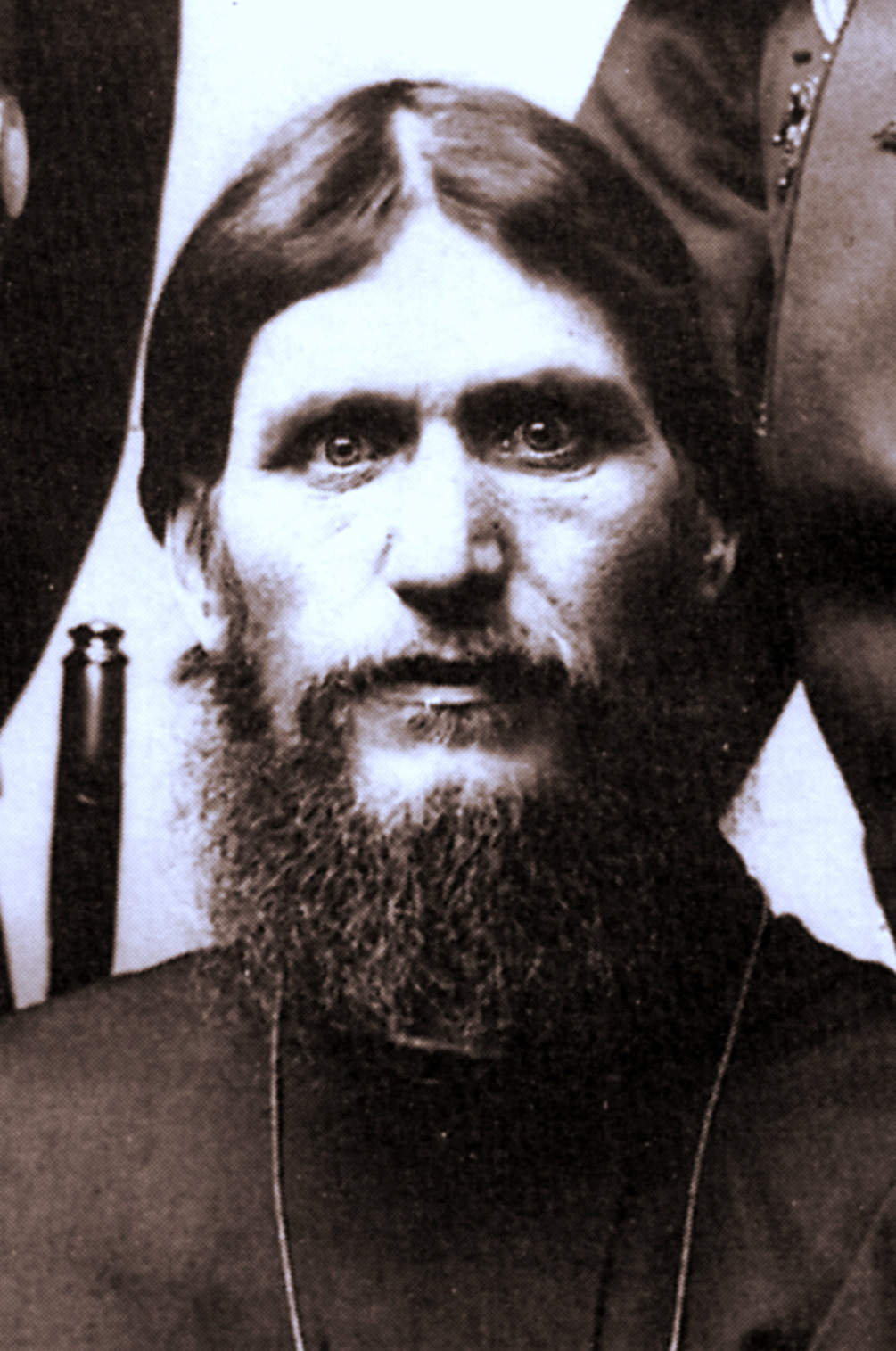Grigori Rasputin was an enigma of his age. He rose from obscurity to become a key friend of the Russian royal family. He was also said to have mystical powers. Here, we start to tell the story of a group who wanted to kill him – and Rasputin’s almost super-human powers to resist death.
The Moika Palace, resplendent in yellow hues, stretches like a supine lion beside the river in St. Petersburg. The residence of the Yusopov family from 1830 to 1917, it was the site of a gruesome murder that continues to mystify and intrigue today, for the details of the night read like a vividly-imagined crime story. No definitive and coherent narrative exists; indeed, the only eyewitness accounts are those of the assassins themselves, and these are, of course, biased. They do, however, provide a starting point from which strands of fiction and truth can be separated and ordered.

The beaming eyes of Rasputin in a photo taken in c. 1905.
Grigori Rasputin’s stratospheric rise to power – akin, perhaps, to Thomas Cromwell’s – transformed him from an illiterate peasant to the trusted confidante of the Russian royal family. This association was divisive, at times scandalous, and ultimately destructive: his presence at court and sway over them – in particular the Tsaritsa – contributed to increasing resentment towards the royal Romanovs in the months preceding the February Revolution of 1917, and precipitated their downfall. An enigmatic figure, much of Rasputin’s life is obscured by conflicting accounts of his character and actions. He was portrayed by his followers as a ‘starets’ or mystical ‘elder’, who possessed supernatural powers to heal the heir to the throne. His critics, on the other hand, regarded him as a licentious and decadent charlatan with a propensity for excessive drinking. He was despised by many in the highest echelons of society, who believed that their bête noire was corroding the popularity of the Romanov dynasty. In the winter of 1916, this resentment became overwhelming.
Prince Felix Yusopov, heir to a vast fortune and husband to the Tsar’s niece, arrived at Rasputin’s house in the middle of the night of December 16 in order to escort him to the Moika Palace. The invitation had been extended at an earlier date: the prince had decided to entice Rasputin to his home by indicating that his beautiful wife, Irina, would be present. In fact, Irina was staying in the Crimea with his parents. Rasputin seemed to have taken particular care over his appearance that evening, donning a silk shirt embroidered with cornflowers, velvet breeches and polished boots. Even his unkempt, matted beard had been combed. Yusopov led Rasputin outside, where a car driven by Dr. Stanislaus de Lazovert was waiting to take them to the palace.
A basement in the east wing had been specially prepared for the occasion. There was a convivial atmosphere: the room was sumptuously furnished with a thick Persian carpet on the floor, and a fire crackled in the background. A gramophone in the adjoining study played ‘Yankee Doodle’, and tempting cakes were laid out on the table. To avoid suspicion, tea had been poured into cups to give the impression that a meal had taken place there recently. The mise-en-scène was set. Unbeknown to Rasputin, Yusopov and his fellow disaffected conspirators had laced the cakes with enough cyanide ‘to kill several men instantly.’ These collaborators, who included the Tsar’s cousin, Grand Duke Dmitry Pavlovich, and a forthright politician, Vladimir Purishkevich, were waiting elsewhere for the deed to be executed. When Rasputin enquired after Irina, he was informed that she would be joining them shortly. Yusopov then proceeded to offer him the sweet pastries and poisoned wine. At first, Rasputin declined, citing reasons of health: had he detected that treachery was afoot? Eventually, however, he relented and sampled a few of the delicacies. They had crossed the Rubicon: Yusopov’s work was complete.
Several hours later, the poisoned wine and pastries had had no effect on Rasputin. One can only imagine Yusopov’s disquiet as that inviolable gaze continued to bore into him with unnerving intensity. Rasputin’s face is almost simian in photographs, with a feral, hypnotic glint in his eyes suggesting a simmering madness. Yusopov recalled in his memoirs: “Under Rasputin’s heavy gaze, I felt all my self-possession leaving me; an indescribable numbness came over me, [and] my head swam.” In desperation, Yusopov retreated upstairs to seek the counsel of the other men, who were shocked at Rasputin’s apparent immunity to the poison. It was agreed that Yusopov should go back armed with a revolver to put an end to the fiend, for who could survive being shot?
But equally, Rasputin had just survived eating cakes laced with cyanide? Was Rasputin as immune to shooting as he was to poison? We’ll continue this story in our unique style next week!
By Julia Routledge
Read on! Part 2 of this article is available by clicking here!
References
- Lost Splendour: The Amazing Memoirs of the Man Who Killed Rasputin – Felix Yusopov
- My Mission to Russia, and Other Diplomatic Memories – Sir George Buchanan
- How To Kill Rasputin: The Life and Death of Grigori Rasputin – Andrew Cook
